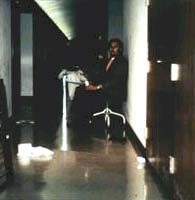 |
 |
 |
 |
A Visit
I was sitting there all alone, waiting anxiously for the intruders to break in, when who should happen along but a colleague and former Yale graduate student roommate, Gordon Bower. Gordon had heard we were doing an experiment, and he came to see what was going on. I briefly described what we were up to, and Gordon asked me a very simple question: "Say, what's the independent variable in this study?"
To my surprise, I got really angry at him. Here I had a prison break on my hands. The security of my men and the stability of my prison was at stake, and now, I had to deal with this bleeding-heart, liberal, academic, effete dingdong who was concerned about the independent variable! It wasn't until much later that I realized how far into my prison role I was at that point -- that I was thinking like a prison superintendent rather than a research psychologist.

In an exploratory study such as this, one problem is defining what the "data" are -- the information we should collect. Also, what should have been done to minimize the effects of experimenter bias on the outcome of the
study? What were the dangers of the principal investigator assuming the role of prison
superintendent?

|
 |

 |
|
 |
 |
 |







